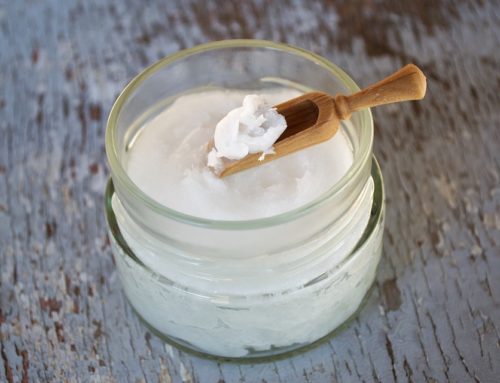Don’t miss breakfast
Researchers published the following fact in Obesity Research in 2002: breakfast is the most important meal for successful weight loss. Another study published in the Journal of Paediatric Psychology in 2002 confirmed that children who were overweight often did not eat in the morning, compared to children who were thinner. And in 1992 a study was already published, which indicated that people who want to lose weight and eat in the morning tend to lose more weight and snack less than those who forget about breakfast.
When can you use coconut oil?
When cooking, roasting, deep-frying and stir-frying. On your bread as butter. As a basis for mayonnaise, curry- peanut sauce or a salad dressing. For your potato or car rot mash, in rice dishes or rice pudding. 1 spoon in hot chocolate. 1 spoon in a smoothie, soup,kefir or kom- bucha. Everywhere where you would tend to use butter or other oils.
Rice crackers spread with coconut oil (butter) and a layer of jam or chocolate flakes. Simply delicious.
Coconut bread/cake with banana
1⁄2 cup of coconut oil
1 cup of maple syrup or another sweetener
2 cups of corn meal
1/2 cup of unrefined salt (optional)
1 coffee spoon of baking powder
3 to 4 bananas (mashed)
1/2 cup of grated coconut
Heat the oven to 180°C. Grease your baking pan and spread some flour so that the cake can be easily removed from the pan. Mix the oil and the maple syrup. Take a separate bowl for the dry ingredients and mix them. Add the mashed bananas to the coconut oil and the sweetener. Then mix everything and pour it into the baking pan. Baking time: Approx. 45 minutes to 1 hour. The cake is ready when you can stick in a toothpick and no dough will stick to it.
Peanut/coconut paste
Grind peanuts or other nuts.
Add coconut oil, mix
and you will obtain a delicious
and easy to prepare sandwich spread.
Extra virgin coconut oil is liquid from 25°C
and easy to spread as a butter between 10°C and 25°C.
Lentil soup with coconut and lemongrass
2 soup spoons of fennel seeds, 2 soup spoons of coriander seeds, 4 soup spoons of coconut oil, 2 red onions chopped finely, 2 carrots finely grated, 2 lemon leaves, 2 cm of galanga root, 2 lemongrass stalks chopped, 4 cloves of garlic, finely chopped, 2 dried peppers, crushed, 4 cm freshly grated ginger, 40 cl coconut milk, 10 cl of red lentils, 2 soup spoons of soy sauce, the juice of 1 lime, 150 cl water, fresh coriander or flat-leaf parsley, sea salt enriched with seaweed
Put the fennel and coriander seeds in a pan and grill them until their aroma is released. Cool down and crush in a mortar and pestle.
Fry the onions, carrots, garlic, lemon leaves, ginger, galanga root, lemongrass and peppers in coconut oil for 5 minutes. Add the coconut milk; the herbs and the water. Bring to a boil and add the lentils.
Let the soup boil until the lentils are done.
Season to taste with soy sauce, lime juice,
sea salt enriched with seaweed and fresh coriander (cilantro).
Muesli bars (for circa 12 bars)
150 g wholemeal flour (buckwheat flour, wheat flour, …)
50 g oat flakes
125 g raisins, 75 g dried apricots, sliced
3 slices of dried pineapple, diced
1 banana, diced, 50 g of grated coconut
1 tablespoon of coconut oil
175 ml of freshly pressed apple juice
1 coffee spoon of molasses
A pinch of cinnamon
Heat the oven to 160°C. Mix all the ingredients in a large bowl with a wooden spoon. Place the mixture in a baking pan coated with baking paper and even out the top. Spread a little grated coconut. Let the mixture Bake for approx. 30 to 40 minutes until it is golden brown. Cut into rectangles and let cool.
Muesli bars with nutsSubstitute the dried fruit in the previous recipe with a mixture of chopped nuts and seeds. Sprinkle the bars with sesame seeds.
Herb dip 4 coffee spoons of coconut oil, 2 coffee spoons of finely chopped onion, 1 coffee spoon of finely chopped garlic, 1⁄2 coffee spoon of basil, 1alt⁄2 coffee spoon of oregano, 1⁄2 coffee spoon of paprika 1⁄2 coffee spoon of unrefined sea salt or rock crystal salt (optional) a pinch of cayenne pepper
Put all the ingredients into a small pan and gently heat. The aim is not to bring it to the boil, but simply to heat so the tastes blend. Delicious as a dip, on your bread or with pasta.
Mayonnaise
1 egg yolk
A hint of unrefined sea salt or rock crystal salt (optional)
1⁄2 coffee spoon of mustard
1 coffee spoon of lemon juice
300 ml coconut oil
First beat the egg yolk well. Then add the mustard, salt or herbs with the lemon juice. Carefully add the coconut oil while stirring. If the mayonnaise is too thick, then you can always add some extra virgin olive oil.
Belgian endives with a mild taste
4 pieces of Brussels endives, a pinch of unrefined sea salt or rock crystal salt (optional) 3 soup spoons of coconut oil, 1 to 2 apples
Melt the coconut oil in a large pan,
Chop the endives in 2 or 4, bake it gently; alt
add the apple slices;
Let caramelize with the endives.
Cover the pan so the endives can
continue to cook.
TIP: Coconut oil is delicious to use in vegetables, omelettes, pastry, béchamel sauces, etc.
Did you know that?
The coconut is named after the Portuguese and Spanish word coco for ‘grimace’ be- cause the three eyes of the coconut resemble a grimacing face. · The Philippines, Indonesia and India are the biggest producers of coconuts. · Coconut oil and other vegetable oils can be an alternative for diesel fuel. · Coconut oil is a good alternative to milk products: It is lactose and sugar-free.
Why coconut oil is so healthy
- Due to its MCT levels, it is an easily digested source of fats, which moreover can serve as direct energy suppliers.
- It improves digestion and the absorption of fat-soluble vita- mins, vegetable substances and aminoacids.
- It also reduces the pressure on the pancreas and other fat-burning enzyme systems in the body.
- In comparison to LTCs it will lead to less fat storage.
- When heated it will not form harmful substances and free radicals (it barely oxidizes) and is thus suited for cooking, deep frying and stir frying.
- It improves the absorption of calcium and mag- nesium and supports strong bones and teeth.
- It improves the functioning of insulin and helps regulate the glycaemic index.
- It supports the thyroid gland’s function and thus increases the metabolic rate, digestion and body temperature.
- It reduces the risk of cardiovascular disease, high blood pressure, heart attacks and embolisms.
- It helps prevent wrinkles and skin ageing due to sun and age.
- It increases the body’s resistance against viruses such as the infl uenza virus, hepatitis C, measles, her- pes, etc. It increases the resistance against bacteria which could lead to pneumonia, ear infections, throat infections, tooth decay, food poisoning, meningitis, gonorrhoea, etc.
- It increases the resistance against funguses and yeasts, which could lead to Candida, ringworm, foot fungus, thrush and other infections.
- It increases the body’s resistance against worms, lice and other parasites and kills them.
- It reduces the risk of chronic infections.
- It promotes the healing of wounds and the skin.
- It improves the symptoms of psoriasis, eczema and other dermatological affl ictions.
- It helps you feel younger and happier.
- It prevents tooth decay. 19. It has no harmful side-effects and is 100% non-toxic, contains no cholesterol and extra virgin coconut oil does not contain any transfats
What does extra virgin coconut oil not do?
- It doesn’t increase cholesterol
- It doesn’t promote blood clotting
- It does not promote cardiovascular disease
- you will not grow fat










